| Listing 1 - 10 of 10 |
Sort by
|
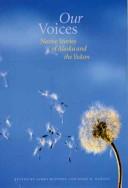
ISBN: 1280374144 9786610374144 0803202369 9780803202368 0803289847 9780803289840 9781280374142 6610374147 0803239440 9780803239449 Year: 2001 Publisher: Lincoln University of Nebraska Press
Abstract | Keywords | Export | Availability | Bookmark
 Loading...
Loading...Choose an application
- Reference Manager
- EndNote
- RefWorks (Direct export to RefWorks)
Storytelling is a precious, vibrant tradition among the Native peoples of the Far North. Collected here for the first time are stories from the communities of interior Alaska and the Yukon Territory. These are the tales the people tell about themselves, their communities, and the world they inhabit. Our Voices showcases twenty storytellers and writers who represent a full range of Athabaskan and related languages of Alaska and the Yukon. Both men and women recount popular tales of ancient times that describe the origins of social institutions and cultural values, as well as meaningful, sometimes intimate stories about their own lives and families or the history of their people. As representatives of an art transmitted through countless generations and now practiced with renewed interest and vigor by people reclaiming their cultural heritage, these narratives create a broad, brightly colored, richly detailed picture of the world of the Far North, present and past.
Tales --- Athapascan mythology. --- Athapascan Indians --- Mythology, Athapascan --- Athabascan Indians --- Athabaskan Indians --- Athapaskan Indians --- Indians of North America --- Folk tales --- Folktales --- Folk literature
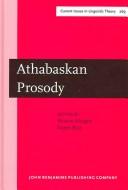
ISBN: 9027247838 1283092379 9027285292 9786613092373 Year: 2005 Volume: 269. Publisher: Amsterdam : J. Benjamins,
Abstract | Keywords | Export | Availability | Bookmark
 Loading...
Loading...Choose an application
- Reference Manager
- EndNote
- RefWorks (Direct export to RefWorks)
This collection of articles on stress and tone in various Athabaskan languages will interest theoretical linguists and historically oriented linguists alike. The volume brings to light new data on the phonetics and/or phonology of prosody (stress, tone, intonation) in various Athabaskan languages, Chiricahua Apache, Dene Soun'liné, Jicarilla Apache, Sekani, Slave, Tahltan, Tanacross, Western Apache, and Witsuwit'en. As well, some contributions describe how prosody is to be reconstructed for Proto-Athabaskan, and how it evolved in some of the daughter languages.
Athapascan Indians --- Athapascan Languages --- Languages --- Athapascan languages --- Langues athapascan --- Athapascan (Indiens) --- Congresses. --- Congrès --- Langues --- Athabascan Indians --- Athabaskan Indians --- Athapaskan Indians --- Indians of North America --- Athabascan languages --- Na-Dene languages --- Tinne languages
Book
Abstract | Keywords | Export | Availability | Bookmark
 Loading...
Loading...Choose an application
- Reference Manager
- EndNote
- RefWorks (Direct export to RefWorks)
Athapascan Indians --- Kinship --- Proto-Athapascan language --- Athapascan languages --- Indians of North America --- Families --- Athabascan Indians --- Athabaskan Indians --- Athapaskan Indians --- Social life and customs --- Terminology --- Languages --- Ethnology. Cultural anthropology --- Lexicology. Semantics --- North and Central American indian languages
Book
ISBN: 1607819945 9781607819943 9781607811756 1607811758 Year: 2012 Publisher: Salt Lake City University of Utah Press
Abstract | Keywords | Export | Availability | Bookmark
 Loading...
Loading...Choose an application
- Reference Manager
- EndNote
- RefWorks (Direct export to RefWorks)
Excavations (Archaeology) --- Athapascan Indians --- Archaeological digs --- Archaeological excavations --- Digs (Archaeology) --- Excavation sites (Archaeology) --- Ruins --- Sites, Excavation (Archaeology) --- Archaeology --- Athabascan Indians --- Athabaskan Indians --- Athapaskan Indians --- Indians of North America --- Antiquities. --- Migrations. --- Origin. --- Southwest, New
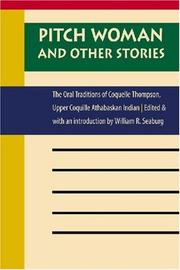
ISBN: 1280823690 9786610823697 0803206224 9780803206229 9781280823695 9780803243330 0803243332 6610823693 Year: 2007 Publisher: Lincoln University of Nebraska Press
Abstract | Keywords | Export | Availability | Bookmark
 Loading...
Loading...Choose an application
- Reference Manager
- EndNote
- RefWorks (Direct export to RefWorks)
The rich oral traditions of the Athabaskan Indians from southwestern Oregon are showcased in these pages for the first time. This volume features vivid and humorous tales of familiar Tricksters: Coyote, known for his unusual sexual prowess and escapades that often go awry; the vain and gullible Grizzly Bear; and Raccoon, often greedy and ever elusive.
Coquille Indians --- Oral tradition --- Athapascan Indians --- Coquelle Indians --- Miluk Indians --- Mishikhwutmetunne Indians --- Mulluk Indians --- Nasami Indians --- Indians of North America --- Athabascan Indians --- Athabaskan Indians --- Athapaskan Indians --- Tradition, Oral --- Oral communication --- Folklore --- Oral history --- Thompson, Coquelle, --- Siletz Indian Reservation (Or.) --- Coast Reserve (Or.) --- Siletz Reservation (Or.) --- Siletz Reserve (Or.) --- History.
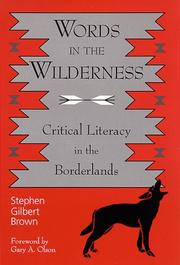
ISBN: 0791493342 0585300305 9780585300306 0791444058 9780791444054 0791444058 9780791444054 0791444066 9780791444061 9780791493342 Year: 2000 Publisher: Albany, N.Y. State University of New York Press
Abstract | Keywords | Export | Availability | Bookmark
 Loading...
Loading...Choose an application
- Reference Manager
- EndNote
- RefWorks (Direct export to RefWorks)
Athapascan Indians --- Critical pedagogy. --- Literacy. --- Teachers --- Faculty (Education) --- Instructors --- School teachers --- Schoolteachers --- School employees --- Illiteracy --- Education --- General education --- Critical humanism in education --- Radical pedagogy --- Critical theory --- Popular education --- Transformative learning --- Athabascan Indians --- Athabaskan Indians --- Athapaskan Indians --- Indians of North America --- Brown, Stephen Gilbert,
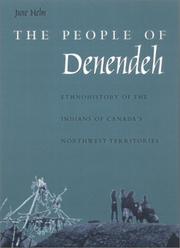
ISBN: 1587293293 9781587293290 0877457352 9781587293795 9780877457350 Year: 2000 Publisher: Iowa City University of Iowa Press
Abstract | Keywords | Export | Availability | Bookmark
 Loading...
Loading...Choose an application
- Reference Manager
- EndNote
- RefWorks (Direct export to RefWorks)
For fifty years anthropologist June Helm studied the culture and ethnohistory of the Dene, "The People," the Athapaskan-speaking Indians of the Mackenzie River drainage of Canada's western subarctic. Now in this impressive collection she brings together previously published essays-with updated commentaries where necessary-unpublished field notes, archival documents, supplementary essays and notes from collaborators, and narratives by the Dene themselves as an offering to those studying North American Indians, hunter-gatherers, and subarctic ethnohistory
Ethnohistory --- Athapascan Indians --- Athabascan Indians --- Athabaskan Indians --- Athapaskan Indians --- Indians of North America --- Ethnohistorical method --- Historical anthropology --- Historical ethnology --- Anthropology --- Ethnology --- Social life and customs. --- History. --- Methodology --- Northwest Territories --- Territoires du Nord-Ouest --- North West Territories --- NWT --- N.W.T. --- GNWT --- Government of the Northwest Territories --- Government of the N.W.T. --- Government of Northwest Territories --- Gouvernement des Territoires du Nord-Ouest --- Nunavut
Book
ISBN: 1438469535 9781438469539 9781438469522 1438469527 Year: 2018 Publisher: Albany, NY
Abstract | Keywords | Export | Availability | Bookmark
 Loading...
Loading...Choose an application
- Reference Manager
- EndNote
- RefWorks (Direct export to RefWorks)
Filipino Americans --- Athapascan Indians --- Racism --- Bias, Racial --- Race bias --- Race prejudice --- Racial bias --- Prejudices --- Anti-racism --- Critical race theory --- Race relations --- Athabascan Indians --- Athabaskan Indians --- Athapaskan Indians --- Indians of North America --- Philippine Americans --- Ethnology --- Filipinos --- Ethnic identity. --- David, E. J. R. --- David, Eric John Ramos --- Alaska --- Â-lâ-sṳ̂-kâ --- AK --- Alaasika --- ʻĀlaka --- Alasca --- Alasijia --- Alasijia Zhou --- Alaska Eyâleti --- Alaska osariik --- Alasḳah --- Alasko --- Alaszka --- Ali︠a︡sk --- Ali︠a︡ska --- Aljaška --- Allaesŭkʻa --- Allaesŭkʻa-ju --- Allaesŭkʻaju --- Alyaska --- Alyaska Shitati --- Arasuka --- Arasuka-shū --- Arasukashū --- Civitas Alascae --- Estado de Alaska --- Estado ng Alaska --- Hakʼaz Dineʼé Bikéyah Hahoodzo --- Medinat Alasḳah --- Politeia tēs Alaska --- Russian America --- Russkai︠a︡ Amerika --- Shtat Ali︠a︡ska --- State of Alaska --- Statul Alaska --- Territory of Alaska --- Πολιτεία της Αλάσκα --- Αλάσκα --- Аљаска --- Аляск --- Аляска --- Алјаска --- Русская Америка --- Штат Аляска --- אלאסקע --- אלסקה --- מדינת אלסקה --- アラスカ --- アラスカ州 --- 阿拉斯加 --- 阿拉斯加州 --- 알래스카 --- 알래스카 주 --- 알래스카주 --- Race relations. --- Alaska Territory
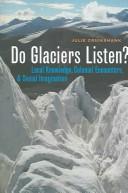
ISBN: 0295985135 0295985143 0774811862 9780295985138 9780295985145 9780774811873 0774811870 9780774811866 9780774851404 Year: 2005 Publisher: Vancouver : Seattle : UBC Press ; University of Washington Press,
Abstract | Keywords | Export | Availability | Bookmark
 Loading...
Loading...Choose an application
- Reference Manager
- EndNote
- RefWorks (Direct export to RefWorks)
Glaciers in America’s far northwest figure prominently in indigenous oral traditions, early travelers’ journals, and the work of geophysical scientists. By following such stories across three centuries, this book explores local knowledge, colonial encounters, and environmental change. Do Glaciers Listen? examines conflicting depictions of glaciers to show how natural and social histories are entangled. During late stages of the Little Ice Age, significant geophysical changes coincided with dramatic social upheaval in the Saint Elias Mountains. European visitors brought conceptions of Nature as sublime, as spiritual, or as a resource for human progress. They saw glaciers as inanimate, subject to empirical investigation and measurement. Aboriginal responses were strikingly different. From their perspectives, glaciers were sentient, animate, and quick to respond to human behaviour. In each case, experiences and ideas surrounding glaciers were incorporated into interpretations of social relations.Focusing on these contrasting views, Julie Cruikshank demonstrates how local knowledge is produced, rather than “discovered,” through such encounters, and how oral histories conjoin social and biophysical processes. She traces how divergent views continue to weave through contemporary debates about protected areas, parks and the new World Heritage site that encompasses the area where Alaska, British Columbia, and the Yukon Territory now meet. Students and scholars of Native studies and anthropology as well as readers interested in northern studies and colonial encounters will find Do Glaciers Listen? a fascinating read and a rich addition to circumpolar literature.
Tlingit Indians --- Athapascan Indians --- Glaciers --- Ice fields --- Human ecology --- Tlingit (Indiens) --- Athapascan (Indiens) --- Champs de glace --- Ecologie humaine --- Saint Elias Mountains --- Saint-Elias, Monts --- Discovery and exploration. --- Découverte et exploration --- Oral tradition --- Fields, Ice --- Icefields --- Cryosphere --- Ice --- Glaciology --- Meltwater --- Athabascan Indians --- Athabaskan Indians --- Athapaskan Indians --- Indians of North America --- Koloshi Indians --- Koluschan Indians --- Lingít Indians --- Thlinket Indians --- Thlinkithen Indians --- Tlinkit Indians --- Coast Ranges --- Environmental conditions. --- Tradition, Oral --- Oral communication --- Folklore --- Oral history --- Ecology --- Environment, Human --- Human beings --- Human environment --- Ecological engineering --- Human geography --- Nature --- Social aspects --- Effect of environment on --- Effect of human beings on --- Discovery and exploration --- Environmental conditions --- #SBIB:39A5 --- Kunst, habitat, materiële cultuur en ontspanning --- Tlingit Indians - Saint Elias Mountains - Folklore --- Athapascan Indians - Saint Elias Mountains - Folklore --- Glaciers - Saint Elias Mountains - Folklore --- Ice fields - Saint Elias Mountains - Folklore --- Human ecology - Saint Elias Mountains --- Oral tradition - Saint Elias Mountains --- Saint Elias Mountains - Discovery and exploration --- Saint Elias Mountains - Folklore --- Saint Elias Mountains - Environmental conditions --- Glaciers in literature --- Climatic changes --- Changes, Climatic --- Changes in climate --- Climate change --- Climate change science --- Climate changes --- Climate variations --- Climatic change --- Climatic fluctuations --- Climatic variations --- Global climate changes --- Global climatic changes --- Climatology --- Climate change mitigation --- Global environmental change --- Teleconnections (Climatology) --- Environmental aspects
Book
ISBN: 1496204069 9781496204042 1496204042 9781496204059 1496204050 9781496204066 9780803295902 0803295901 9780803295902 Year: 2017 Publisher: Lincoln, NB
Abstract | Keywords | Export | Availability | Bookmark
 Loading...
Loading...Choose an application
- Reference Manager
- EndNote
- RefWorks (Direct export to RefWorks)
Frontier and pioneer life --- Missionaries --- Racially mixed people --- Irish-Americans --- Mountaineers --- Athapascan Indians --- Mountaineering --- Climbing mountains --- Mountain climbing --- Hiking --- Outdoor life --- Athabascan Indians --- Athabaskan Indians --- Athapaskan Indians --- Indians of North America --- Climbers, Mountain --- Mountain climbers --- Rock climbers --- Athletes --- Irish Americans --- Ethnology --- Irish --- Bi-racial people --- Biracial people --- Interracial people --- Mixed race people --- Mixed-racial people --- Mulattoes --- Multiracial people --- Peoples of mixed descent --- Ethnic groups --- Miscegenation --- Stuck, Hudson, --- Harper, Walter, --- Friends and associates. --- Denali, Mount (Alaska) --- Bolshoy Mountain (Alaska) --- Bulshaia Gora (Alaska) --- Bulshaya Gora (Alaska) --- Bulshoe (Alaska) --- Churchill Peaks (Alaska) --- Deenaalee Mountain (Alaska) --- Deenadhee (Alaska) --- Deenadheet (Alaska) --- Deenalee (Alaska) --- Deghilaay Ce'e (Alaska) --- Deghilaay Ke'e (Alaska) --- Delaykah (Alaska) --- Denadhe (Alaska) --- Denagadh (Alaska) --- Denaze (Alaska) --- Dengadh (Alaska) --- Dengadhe (Alaska) --- Dengadhi (Alaska) --- Dengadhiy (Alaska) --- Densmore's Mountain (Alaska) --- Densmores Peak (Alaska) --- Dghelaay Ce'e (Alaska) --- Dghelaay Ke'e (Alaska) --- Dghelay Ka'a (Alaska) --- Dghili Ka'a (Alaska) --- Diinaadhi (Alaska) --- Diinaadhii (Alaska) --- Diinaadhiit (Alaska) --- Diinaalii (Alaska) --- Diinaazii (Alaska) --- Diineezi (Alaska) --- Din-al-ee (Alaska : Mount Denali) --- Din-az-ee (Alaska : Mount Denali) --- Doleika (Alaska) --- Doleyka (Alaska) --- McKinley, Mount (Alaska) --- Mount Denali (Alaska) --- Mount Doleika (Alaska) --- Mount McKinley (Alaska) --- North Peak (Alaska : Mount Denali) --- South Peak (Alaska : Mount Denali) --- Tenada (Alaska) --- Tenda (Alaska) --- Tennaly (Alaska) --- To-lah-gah (Alaska) --- Traleika (Alaska : Mount Denali) --- Traleyka (Alaska) --- Alaska Range (Alaska) --- Description and travel. --- Stuck, James Hudson,
| Listing 1 - 10 of 10 |
Sort by
|

 Search
Search Feedback
Feedback About UniCat
About UniCat  Help
Help News
News